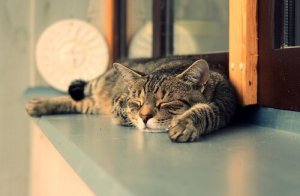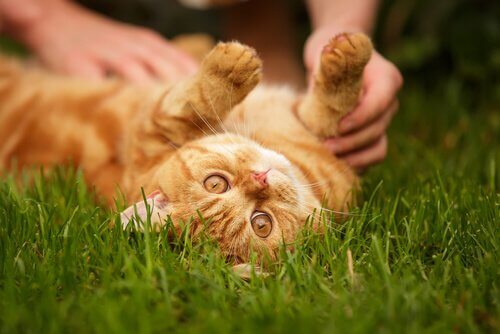7 Reasons Cats Sleep More During the Day Than at Night

Did you know that adult cats sleep 12-15 hours during the day, and that kittens need 20 hours of sleep a day? This might give you an idea of why they’re the kings and queens of the bed. Keep reading if you want to learn why it is that cats sleep so much more during the day!
Why do cats sleep more during the day?
If you have a cat, you probably already know they love to sleep, especially during the day. By nighttime, they’ve recharged their batteries. This is why they always want to play, eat, or go outside when you’re trying to go to sleep. Here are the reasons they sleep so much more during the day:

1. Appetite
Obviously living with you at home means your cat doesn’t need to go out hunting. Its food is right there waiting for it. But its natural instincts keep it more alert at night. Sleeping during the day means it has the energy to find food for itself after sunset.
Cats are also such good hunters that they only need a couple hours to find food at night…the rest of the time, they can just sleep.
2. Survival
Kittens sleep a lot when they’re born, like human babies. That has to do with the need to be in a safe place, free of danger, when their mother goes out to hunt. If they stay asleep, their predators won’t find them. On top of that, their body releases growth hormones while they sleep.
3. Nature
Another thing cats have held onto from their wild roots is the amount of energy they use up. If they were out on their own, they’d have to take advantage of every calm, safe moment to rest. That way, if there were a night of a few hours straight when they had to stay alert, that wouldn’t be a problem.
4. Age
Like we’ve mentioned, kittens need to sleep loads during the day. As they grow older, they start to sleep less and less. But once they grow up and start to grow old, they begin to need more sleep again.
5. Temperature
Cats sleep more in cold weather so that they can save energy and only use up their body heat when they need to. They might also decide to sleep in the sun to regulate their body temperature or go into a cool area in the summer. That helps them stay more active when the weather is pleasant.
6. Sexual desire
Cats also sleep less when they’re in heat because they spend a lot of their time looking for mates, marking their territory with urine, and trying to get the attention (sometimes by fighting) of males. So, sterilized cats generally sleep longer during the entire year. They don’t have the natural desire that makes them so much more active.
7. Activities
Boredom is another big reason cats generally sleep longer during the day. For example, if it’s alone all day and has no one to play with, it’ll sleep (which is better for you, because otherwise it would probably destroy your furniture and tear up your things!).
The problem is that this means they’re not tired at night, which is why they’ll annoy you by trying to get your attention when you’re trying to sleep.
How do you get your cat to sleep at night?

This might sound impossible to cat owners, but there are actually two ways you can try to change your cat’s habits for the sake of your own sleep:
1. Exercise
Try to play with your cat for at least a half an hour when you get home. That will tire it out and it might want to sleep a bit. Ideally, you should get it to exercise right before you go to bed. Just don’t overdo it, because if it recharges its batteries it might “need” to be active for longer.
2. Punishment
Another way to keep your cat from bothering you at night is to try to discourage this behavior. It is actually possible to train cats this way. For example, you can keep a spray bottle on your nightstand. If your cat starts to make a lot of noise or bothers you, you spray it with the water. Repeat that as many times as you need to until your cat learns.
This text is provided for informational purposes only and does not replace consultation with a professional. If in doubt, consult your specialist.